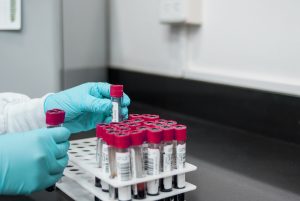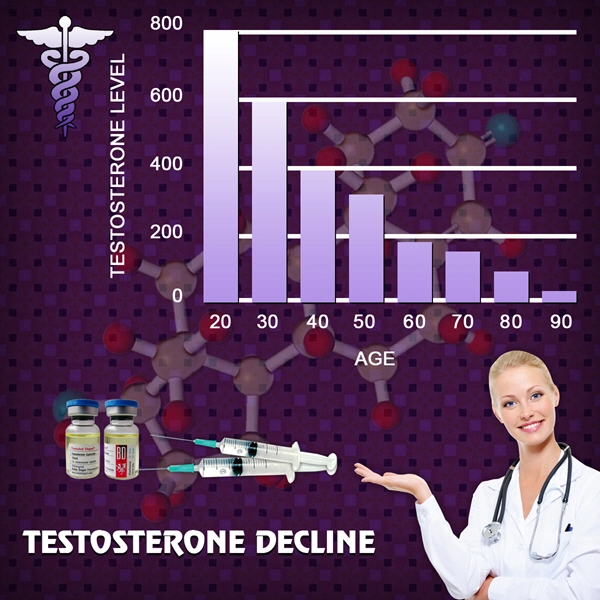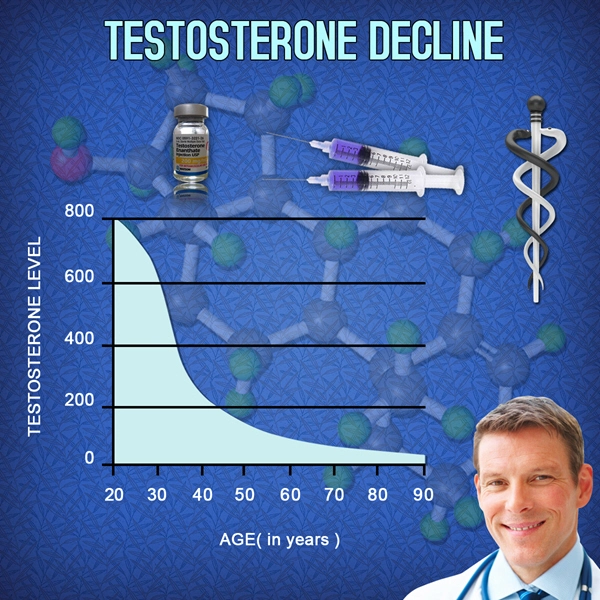 An article published in The Journal of Clinical Endocrinology & Metabolism determined that there is a relationship between testosterone levels and fracture risk in older, Australian men.
An article published in The Journal of Clinical Endocrinology & Metabolism determined that there is a relationship between testosterone levels and fracture risk in older, Australian men.
The relationship was specifically a “U-shaped” relationship when looked at on a graph.
Men that had a midrange testosterone concentration in their bloodstream had the lowest risk of sustaining a fracture during a full decade of study follow-up.
Testosterone Levels Predict Incidence of Fractures in Older Men
Study author, Bu Beng Yeap, professor at the University of Western Australia Medical School, stated: “Levels of testosterone, rather than estradiol [estrogen], predict the incidence of fractures in older men.” That is incredible that we have predictive power in terms of ascertaining fracture risk.
Fractures can be devastating for older men and women. If an older adult suffers from a fracture, and especially a hip fracture, it’s more likely that complications will arise, versus if the same fracture happened in a younger adult.
Complications include death, severe pain, disability, depression, and loss of independence. There is a high risk of morbidity and mortality in older adults when suffering from a fracture. This is serious stuff, people!
Because the graph is U-shaped when fracture risk is plotted against testosterone levels, “men with low testosterone levels are at higher risk. Men with testosterone levels in the middle of the range have the lowest risk.”
 Australian Cohort of Men Demonstrate the Importance of Healthy Testosterone Levels
Australian Cohort of Men Demonstrate the Importance of Healthy Testosterone Levels
For the study, 3,307 men from Perth, Western Australia were used as the subjects. The average age of the men was 77 years. Baseline levels of hormones were taken from the blood between 2001-2004.
The hormones analyzed were plasma testosterone, dihydrotestosterone, estradiol, sex hormone-binding globulin (SHBG), and luteinizing hormone (LH).
Researchers followed up after 10.6 years. 330 men sustained a fracture at a rate of 1.1% per participant per year. Hip fractures were sustained by 144 men with a rate of 0.5% per participant per year.
As stated previously, men that had testosterone levels in the midrange had the lowest risk for fracture incidence whereas low testosterone levels had the highest risk. In addition, men with SHBG levels in the higher range were more likely to sustain a hip fracture when compared to men with lower SHBG. Dihydrotestosterone, estradiol, and LH were not associated with any fracture risk.
Yeap also stated that “randomized clinical trials are needed to see whether treating men who have low testosterone levels would reduce their risk for fracture.” That would be a great study, for sure!
 Maintaining Optimal Testosterone Levels is Critical
Maintaining Optimal Testosterone Levels is Critical
It is critical that, as men age, they take their testosterone levels seriously. If not, they are at increased risk of breaking a hip or fracturing some other important bone, potentially leading to serious complications and a lower quality of life. You didn’t work hard all your life to experience something as devastating as a fractured hip!
It’s so easy to get your testosterone levels checked. Just contact our clinic by telephone or filling out the contact form. We can get you set up with a blood center near you to get tested very quickly with fast analysis by our endocrinologists. If it turns out that your testosterone levels are too low or too high, outside of the optimal range, it is highly recommended to get this under control.
It’s more likely that a man’s testosterone levels will be lower as he ages because levels tend to decrease by 1% each year after the age of 30.
This is where testosterone replacement therapy (TRT) comes in. This therapy is highly effective and safe when used under the guidance of an endocrinologist, just like at our clinic. There is almost zero risk of an overdose or adverse side effects.
Contact us today to get your levels checked!
 Hip Fracture Prevention Tips
Hip Fracture Prevention Tips
Number one, take your risk seriously. If you are 50 or older, then you are already at higher risk. Get your testosterone levels checked as soon as possible. One in three women and one in five men will have a fracture at some point after 50 years of age.
Screen your bone health and maintain high bone density. Low bone density can double or triple your risk of a hip fracture. 56 percent of women and 18 percent of men aged 50 or older have reduced bone mineral density. Talk to your doctor about regular screening for osteoporosis, especially if you are female or a man who was on a long-term prednisone prescription.
Maintain strong muscles! Nine out of ten hip fractures are caused by falls. With strong muscles, you are less likely to fall. A regular exercise routine can cut your risk of a fall by 20-30 percent!
Eat a healthy diet that contains adequate calcium and vitamin D, which is needed to absorb calcium. The recommended daily value is 1,200 mg for women over 50 and men over 70 for calcium. In addition, make sure you consume lots of potassium-rich veggies and fruits because potassium also increases calcium metabolism.
Lastly, get your eyes and metabolism checked regularly. Having good vision will reduce your risk of tripping and falling. If you feel dizzy, weak, or off-balance when walking, tell your doctor and get a medicine check. Some medicines can cause such side effects.
Just follow the five tips above and contact our clinic to get your testosterone levels checked and you’re good to go!
References

- Live Consciously and Live Better [Last Updated On: September 3rd, 2025] [Originally Added On: November 4th, 2020]
- HGH Injections: A New Revolution in Longevity, Health, Medicine, and Life Quality -- HGH Injection [Last Updated On: September 2nd, 2025] [Originally Added On: November 10th, 2020]
- The Baby Boomer Dilemma -- To Use, or Not to Use, HGH to Fix Your Lifestyle Mistakes [Last Updated On: November 16th, 2025] [Originally Added On: January 10th, 2021]
- How HGH and Testosterone Can Make a Huge Difference in Your Life [Last Updated On: October 24th, 2025] [Originally Added On: January 11th, 2021]
- 34 Good Health Tips to Improve Your Health and Wellness [Last Updated On: October 20th, 2025] [Originally Added On: January 17th, 2021]
- Personal Human Growth Hormone HGH Testimonial [Last Updated On: October 21st, 2025] [Originally Added On: January 18th, 2021]
- Starting Your HGH Therapy Program [Last Updated On: October 18th, 2025] [Originally Added On: January 26th, 2021]
- Human Growth Hormone for Body Sculpting [Last Updated On: August 20th, 2025] [Originally Added On: January 27th, 2021]
- Human Growth Hormone Replacement Therapy for Men [Last Updated On: May 24th, 2025] [Originally Added On: January 29th, 2021]
- Get Optimal Results on an HRT Program with Proper and Effective Nutrition [Last Updated On: February 17th, 2025] [Originally Added On: February 4th, 2021]
- An Introduction to the Lymphatic System [Last Updated On: October 19th, 2025] [Originally Added On: February 6th, 2021]
- Basic Human Growth Hormone Information [Last Updated On: October 23rd, 2025] [Originally Added On: February 11th, 2021]
- Buying HGH Legally. Is HGH legal in the United States ? [Last Updated On: October 22nd, 2025] [Originally Added On: February 18th, 2021]
- Zap The Ugly Fat With Human Growth Hormone [Last Updated On: October 15th, 2025] [Originally Added On: February 20th, 2021]
- COVID-19 Global Pandemic: Boosting Your Immune Defense with Growth Hormone [Last Updated On: August 22nd, 2025] [Originally Added On: February 24th, 2021]
- Early Exposure to BPAs Can Cause Serious Damage Later in Life for Elderly Men [Last Updated On: May 18th, 2025] [Originally Added On: March 2nd, 2021]
- Ascendis Pharma Given the Go-Ahead by FDA to Develop Long-Acting HGH Treatment [Last Updated On: August 23rd, 2025] [Originally Added On: March 4th, 2021]
- Growth Hormone Leads to Liver Regeneration and helps support healing post surgery. [Last Updated On: September 5th, 2025] [Originally Added On: March 5th, 2021]
- Anti-Aging HGH Research of Growth Hormone Injections [Last Updated On: October 17th, 2025] [Originally Added On: April 24th, 2021]
- Anti-Aging News: HGH Shown to Reverse Aging in New Study! [Last Updated On: May 23rd, 2025] [Originally Added On: May 4th, 2021]
- Stop Premature Aging Dead in its Tracks with Growth Hormone! [Last Updated On: May 28th, 2025] [Originally Added On: May 14th, 2021]
- Human Growth Hormone and Cell Regeneration [Last Updated On: October 16th, 2025] [Originally Added On: May 20th, 2021]
- Increased Belly Fat? Blame it on Your Hormones! [Last Updated On: May 22nd, 2025] [Originally Added On: May 21st, 2021]
- Joe Rogan -- Palumboism Due to Hormone Abuse? [Last Updated On: October 14th, 2025] [Originally Added On: May 22nd, 2021]
- Hormone Therapy May Help Post-Menopausal Women Postpone Onset of Atherosclerosis [Last Updated On: October 13th, 2025] [Originally Added On: May 23rd, 2021]
- If You Suffer From Low-T, You’re More at Risk for Severe COVID-19 Symptoms [Last Updated On: May 30th, 2025] [Originally Added On: May 30th, 2021]
- Hormone Effects:: My Mind Is Racing and I Feel Like I’m Going Crazy - Could Hormones Be the Cause? [Last Updated On: February 20th, 2025] [Originally Added On: August 3rd, 2021]
- Fake News About Hormone Replacement Therapy for Women [Last Updated On: May 17th, 2025] [Originally Added On: September 16th, 2021]
- Overcome HGH Deficiency with Ipamorelin Acetate Injections [Last Updated On: September 18th, 2025] [Originally Added On: September 21st, 2021]
- About to be a Father? How Hormones Will Affect Your Parenting [Last Updated On: April 8th, 2025] [Originally Added On: March 7th, 2022]
- Fighting Off Brain Fog to Think More Clearly [Last Updated On: November 7th, 2025] [Originally Added On: May 30th, 2022]
- HGH Vs. Testosterone: Which One Do You Need? [Last Updated On: May 4th, 2025] [Originally Added On: November 30th, 2022]
- Low HGH Levels Can Lead to Cognitive Impairment [Last Updated On: February 20th, 2025] [Originally Added On: April 12th, 2023]
- The Role of Human Growth Hormone (HGH) and Cognitive Impairment [Last Updated On: November 14th, 2025] [Originally Added On: February 11th, 2025]
- The Impact of Hormones on Mental Health [Last Updated On: February 17th, 2025] [Originally Added On: February 17th, 2025]



List of USA state clinics - click a flag below for blood testing clinics.
Word Count: 897


















































